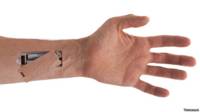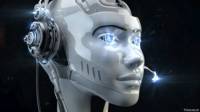How is life modern cyborg
- October 14, 2014
Share

What’s it like – to be a cyborg? Regular contributor to BBC Future debunks common myths about bionic limbs, implanted microchips and other attributes of cybernetic organisms.
In the middle of summer, when London was very hot, I decided to plunge into the trouble Serpentine pond. In this small pond in Hyde Park, in the city center, since the XVIII century brought the habit cools inflamed sun bathers. I left my clothes on the bank and jumped into the cool water. And then he heard a strange crackling I forgot to remove hearing aids. So in the dark green pond choked my recently returned hearing.
The next day, two apparatik, pea red and blue, still no signs of life. Fortunately, my otolaryngologist soon found time to receive me. I thought he chastise me for forgetting, but, on the contrary, said enthusiastically: “You see, it means that your brain is completely adapted to these devices”.
In this complete adaptation there is a downside . My brain is no longer adapted to life without hearing aids. Without them, I hear worse than heard before. Small electronic ear were a continuation of me. I can not physically separate from them (removed from the ear and hold in your hand), but from my ears, I could not break away. And I hear in part due to the ears, and in part – because of this electronics.
In the end, if you learn to run very quickly, perhaps as a result of flight – and there’s only one way to find out
It turns out that I became a cyborg as necessary, and not a whim. Part of my body is a machine, and for him it’s okay. But ROBOCOP or Universal Soldier I do not feel. If I’m a cyborg, then where is my superhuman abilities?
There is a big difference between the descriptions of cyborgs in science fiction and real life people who depend on artificial implants or prostheses.
In the process of working on this column, I spoke with a variety of people I met during the past year. Each of them was introduced to the concept of empowerment of our body: the artist, hear colors, to the man who gets his bike using implanted microchip in the hand. What observations of their lives, they can share?
“The idea of devices that complement the man is not new – says Amal Graafstra motorcyclist with a chip in his hand, which I interviewed in February. – People began to supplement the devices themselves even then, when I first took up stones, sticks and began to use the tools. ” Just tools have become smaller and easier to use. “That was the trend, it will remain so. From rudimentary objects, stones and sticks, to the forged steel and electronic circuits, and in the future and genetic engineering – and everywhere one and the same principle as transhumanism: the desire to continuously and significantly transform the human condition “- says Graafstra.

Many believe this concept of transformation dangerous. In science fiction, not to consider the fictional worlds in which the modification of the body divided society into elite and rogue. Is it true transhumanism puts so tough choice: evolve with the help of technology, or wither?
“Yes, there are fears that body modification can lead to a kind of arms race that will leave behind a society of those who decided to do anything are not doing. But such a scenario is possible only on the condition that people will move only one goal to beat the neighbor “- says transhumanist philosopher Gennady Stolyarov. In April, in an interview, he told me that death need not be inevitable.
Stolyarov believes that instead of endlessly optimize themselves in an attempt to achieve the ideal, most people of the future will focus on individuality. “Different individuals will modify itself in different ways, expanding its capabilities in different directions. There will be a single hierarchy with supermodifitsirovannymi people on top of the pyramid and the ordinary people at its foot. Instead, as a result of the adoption of new technologies by society there a future in which the modification of the body flourish full flower, “- said Stolyarov.
I view it closer, and I share his vision. Mass literacy has not caused all the desire to read the same books, and created a market for the very different literature – from pulp novels to solid volumes on ancient history. People study the ideas which, in their view, reflect their own view of the world. There is every reason to believe that the same principle will be applicable to future technologies.
In my experiment, no one observed induced coma in self-gratification. People still arranged more complicated than the rat
But in the world of cyborgs we are unlikely to feel superhuman. Paul Carter, in his youth, doctors have done so much specialized prostheses that their set was to remind the Swiss Army knife. Carter notes that the modification of the body – it is not a magic wand, instantly giving any superpowers, or at least normal abilities trained person: “If you give a man sprung prostheses sprint star of he would not. This requires a base in the form of talent and good sports training. discoveries we’ve made in prosthetics, have great potential and can improve the lives of many people with disabilities, but they need to look in the context of a more general social picture, not simply as a means to achieve a single goal. “
Gabriel Licinius, who experimented with the discovery in humans infrared vision, agrees. “We need to dispel the myth that the modification of the body easily turns us into superhumans. Important not to go beyond the scientific reality. Course, improve the human is possible, but it is much more difficult than to eat a pill or press” – says Licinius.
He cites the example of his own experiments, his subjects found that they can see better in the dark, following a certain diet, but at the same time they began to perceive worse green and blue colors.
Transhumanism – not the best form of wish fulfillment. Many say they would like to learn to fly, but the same people can not bring myself to even run. Modification of the body should be seen less as a solution to the problem, but as a tool of self-development in the right direction. In the end, if you learn to run very quickly, perhaps as a result of flight – and there’s only one way to find out.
From research Licinius can make another important lesson: the modification of the body is not limited to technical devices. Not necessarily to implant himself in the head chip to improve brain function – you can do biological means. This theme is developed by John Cryan: He told me that people can make smarter certain bacteria in the gut, without any wires and chips. “Talking about the modifications of the brain, do not forget about the rest of the body. Specialists neuroscientists should realize the importance of signals from the periphery, from the immune system, hormones or gut microbes” – believes Cryan.
In the fantastic descriptions of people cyborg often slips moralistic note, as old as humanity itself: how pride leads to a fall. It is believed that mankind can play too in improving yourself and lose control over what’s happening. Technology can be addictive: Who of us sat in a restaurant with friends, buried in their smartphones?

I talked with Stuart Meloy, the creator of a device that gives pleasure when you press the button. He believes that humanity is not lost: “As for the implants generators pleasure expressed concern that such a device can cause a person to stop to look after themselves as notorious rats that died of hunger, because they had the opportunity to stimulate the pleasure centers in the brain pressing the lever. But in my experiment, no one observed induced coma in self-gratification. People still arranged more complicated than rats “.
There are those who oppose the modifications of the body, suggesting that it is unnatural. This argument has always seemed to me a little strange. Usually those who pushes him to believe that a man must necessarily be the same as they are. Neil Harbisson is an antenna that allows him to hear color. He did not see anything unnatural. “It is believed that by modifying itself, we lose something human, but I think there is nothing more human as time can not come up with – he says. – I totally disagree with the view that the alliance with technology distances us from reality of nature or from other living beings. Mark me: technology is not made me feel closer to the machines or robots, quite the contrary. Availability antenna makes me closer to insects and other creatures that have antennae; hearing through bone makes me closer to dolphins and other sea creatures that can hear exactly, ultraviolet and infrared vision makes me closer to animals and insects, perceiving this range. I feel a closer connection with nature than ever. Technology can help us get back to nature “- believes Harbisson.
The British summer is over, autumn in the yard, and swim in the pond, I did not go, but the question of how closely my body is able to integrate a car, I can not help. I understand that I do not become a superman, but that does not stop to explore different options for expanding my capabilities through technology and biology.
Soon I will have a unique new hearing aids, prototypes of which are now being tested by the company in the south of London. They will not only enhance the surrounding sounds, but also to transform the electromagnetic field into audible signals. Will my brain to adapt to this? Will the other person have the ability to perceive the electromagnetic environment? The answers to these questions will give time and standing exercises.
Who knows what the future zavedut us these first steps? Perhaps we, cyborgs, ever become watertight.
Read the original of this article is available in English on the website BBC Future.
No comments:
Post a Comment